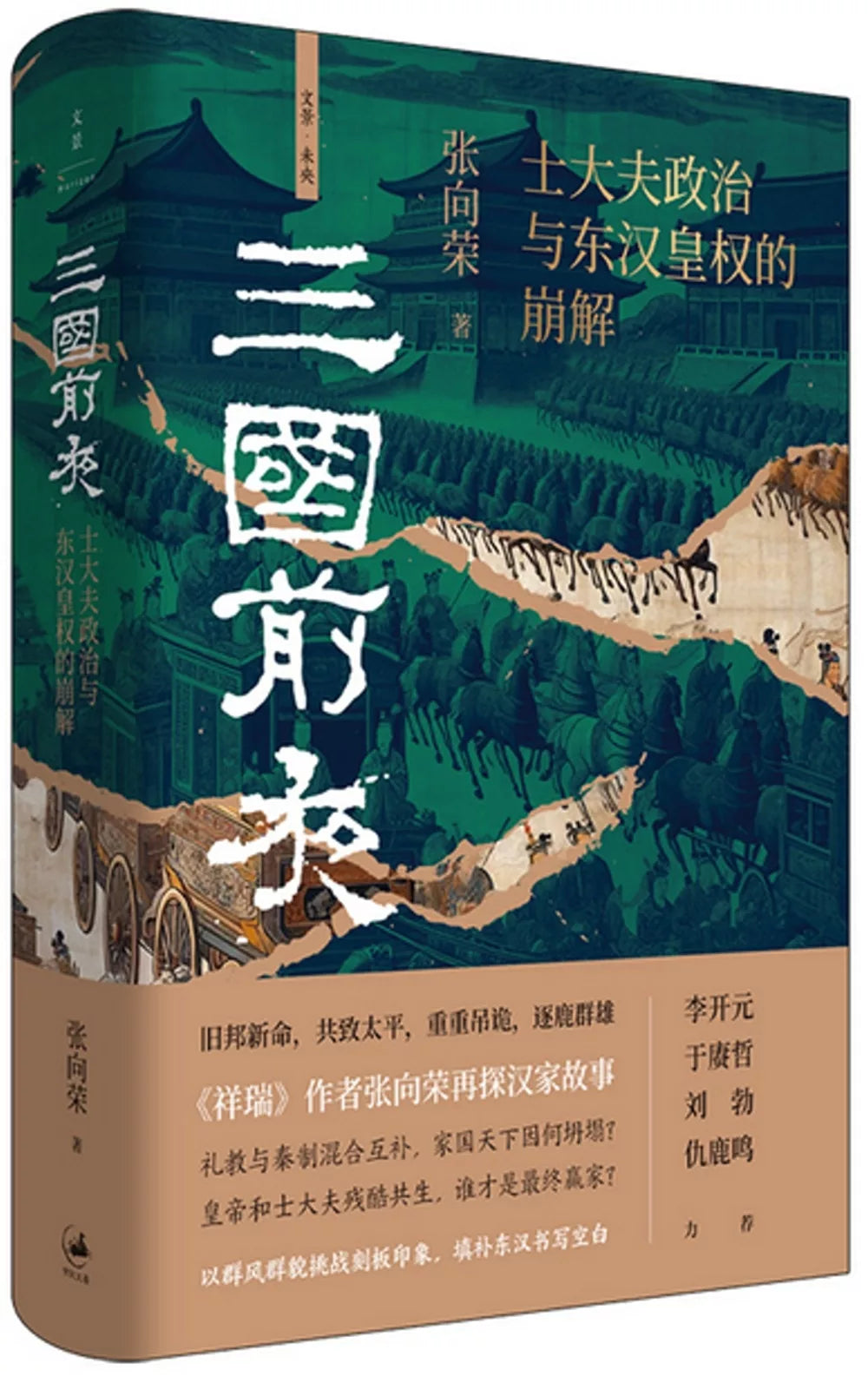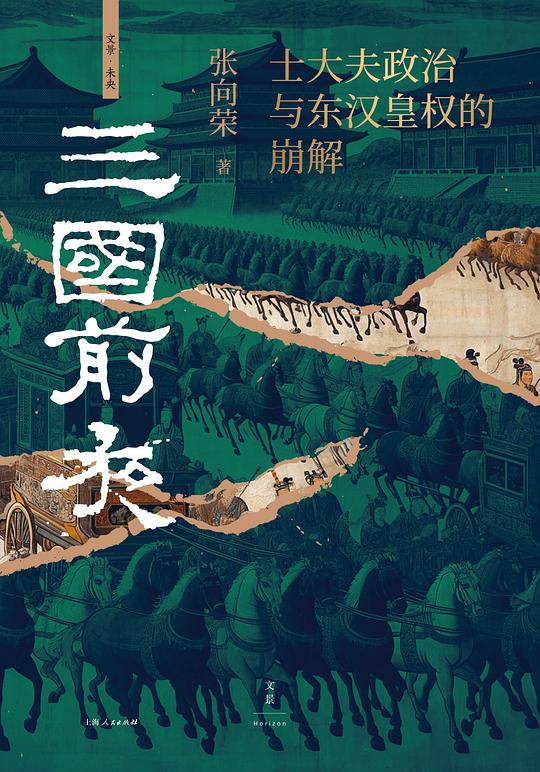1
/
of
2
Eve of the Three Kingdoms
Eve of the Three Kingdoms
Zhang Xiangrong
Regular price
$26.99 USD
Regular price
Sale price
$26.99 USD
Unit price
/
per
Low stock
Couldn't load pickup availability
About Book
About Book
Xiamen, located in the north of Luoyang City, is a thoroughfare with a constant flow of people. However, because it faces the Mang Mountain to the north, it is also a place where humans and ghosts have different paths.
The gatehouse outside Xiamen Gate was naturally bustling with people coming and going. General Liang Ji had deliberately dumped the bodies of Li Gu and Du Qiao outside Xiamen Gate for all to see. Even high-ranking officials who opposed him would suffer the same fate. He also issued an order that anyone who dared to mourn or weep would be punished.
Empress Dowager Liang agreed to kill Li and Du, motivated by a desire to protect the Liang family's personal vendetta and a fear of the power of the literati to uphold Confucian ethics. The deaths of Li and Du seemed like a prelude. Their execution by powerful officials for the sake of maintaining order in the empire tore a rift in the Han dynasty's harmonious facade, raising the old question once again:
Does the world belong to the Han Dynasty, or to the world?
This will become the core of the changes in the next hundred years, and it contains the code to whether the Han Dynasty will survive or end.
————————————————————
The old country has a new destiny, and they work together for peace. However, there are many paradoxes, and the heroes compete for supremacy. The author of "Auspicious Signs" Zhang Xiangrong re-explores the story of the Han Dynasty. The ethics and ethics of the Qin Dynasty were mixed and complementary. Why did the family, country and the world collapse?
The emperor and the literati coexist cruelly, who is the ultimate winner?
Challenging stereotypes with group customs and appearances, filling the blank in the writing of the Eastern Han Dynasty Li Kaiyuan, Yu Gengzhe, Liu Bo, Qiu Luming - Highly recommended -
"The Eve of the Three Kingdoms" is a new historical nonfiction masterpiece by young literary and historical writer Zhang Xiangrong. A sequel to "Auspicious Omens: Wang Mang and His Era," this book explores the "Second Han Dynasty," inspired by the Xin Dynasty, and explores how Confucianism, after failing to cultivate a "philosopher-king," perpetuated its cultural vitality. The Eastern Han Dynasty possessed a relatively mature political and religious system in its early stages, a "Qin system-Confucianism" political system. This served as the underlying logic for the stability of the Han dynasty. However, the tensions within this system ultimately led to the demise of the Qin and Han empires, unravelling centuries of "great unity."
This book focuses on the nearly fifty years of rule of Emperors Huan and Ling in the late Eastern Han Dynasty. At the same time, it comprehensively and systematically restores the whole process of the Party and Faction Persecution, carefully examines the mentality, purpose and behavior of the people in the Party and Faction Persecution, interprets the role played by Confucianism in it, how the "scholar-official politics" was formed, and why it shifted from assisting the Han Dynasty to assisting the Three Kingdoms.
The author attempts to use "group portrait" writing to present the ideas and even the style of the times of ordinary people other than the literati, eunuchs, royal family and heroes of this period, and supplemented by charts to sort out the relationships between the characters, and then ask: Although the imperial power of the Eastern Han Dynasty collapsed, the "Qin system-Confucianism" structure did not collapse with it. How did it rely on the emerging Confucian literati to be continuously rebuilt in later generations?
————————————————————
The object of literary research is literary works, and writers and their works are the main body of literature. The object of historical research is history as past events. Who writes history has become a blank in history. Mr. Zhang Xiangrong's academic major is literary research. He first wrote "Auspiciousness" and now "The Eve of the Three Kingdoms". He used his love for non-fiction history writing to fill the gap in historical writing. It is worth reading and worth pondering. - Li Kaiyuan All crises started from the tip of the green weeds. Only when the tall building collapses can the rotten foundation be seen. This book is a pulse diagnosis of the root causes of the chaos in the Three Kingdoms. - Yu Gengzhe's writing ability to transform complex academic research into light narrative is rare. There is no core event, no main character, but the changes in the political ecology and social customs over the past two hundred years are presented smoothly. The dark night like thick ink finally spreads into the vastness. Liu Bo: "When the late emperor was still alive, whenever he discussed this matter with me, he would always sigh and lament his hatred for Emperors Huan and Ling." This passage from Zhuge Liang's "Memorial to the Emperor on Leaving the Capital" suggests that in the minds of people at the time, the history of the Three Kingdoms was actually an extension of the various issues that arose after the mid-Eastern Han Dynasty. This book attempts to outline this clue.
The gatehouse outside Xiamen Gate was naturally bustling with people coming and going. General Liang Ji had deliberately dumped the bodies of Li Gu and Du Qiao outside Xiamen Gate for all to see. Even high-ranking officials who opposed him would suffer the same fate. He also issued an order that anyone who dared to mourn or weep would be punished.
Empress Dowager Liang agreed to kill Li and Du, motivated by a desire to protect the Liang family's personal vendetta and a fear of the power of the literati to uphold Confucian ethics. The deaths of Li and Du seemed like a prelude. Their execution by powerful officials for the sake of maintaining order in the empire tore a rift in the Han dynasty's harmonious facade, raising the old question once again:
Does the world belong to the Han Dynasty, or to the world?
This will become the core of the changes in the next hundred years, and it contains the code to whether the Han Dynasty will survive or end.
————————————————————
The old country has a new destiny, and they work together for peace. However, there are many paradoxes, and the heroes compete for supremacy. The author of "Auspicious Signs" Zhang Xiangrong re-explores the story of the Han Dynasty. The ethics and ethics of the Qin Dynasty were mixed and complementary. Why did the family, country and the world collapse?
The emperor and the literati coexist cruelly, who is the ultimate winner?
Challenging stereotypes with group customs and appearances, filling the blank in the writing of the Eastern Han Dynasty Li Kaiyuan, Yu Gengzhe, Liu Bo, Qiu Luming - Highly recommended -
"The Eve of the Three Kingdoms" is a new historical nonfiction masterpiece by young literary and historical writer Zhang Xiangrong. A sequel to "Auspicious Omens: Wang Mang and His Era," this book explores the "Second Han Dynasty," inspired by the Xin Dynasty, and explores how Confucianism, after failing to cultivate a "philosopher-king," perpetuated its cultural vitality. The Eastern Han Dynasty possessed a relatively mature political and religious system in its early stages, a "Qin system-Confucianism" political system. This served as the underlying logic for the stability of the Han dynasty. However, the tensions within this system ultimately led to the demise of the Qin and Han empires, unravelling centuries of "great unity."
This book focuses on the nearly fifty years of rule of Emperors Huan and Ling in the late Eastern Han Dynasty. At the same time, it comprehensively and systematically restores the whole process of the Party and Faction Persecution, carefully examines the mentality, purpose and behavior of the people in the Party and Faction Persecution, interprets the role played by Confucianism in it, how the "scholar-official politics" was formed, and why it shifted from assisting the Han Dynasty to assisting the Three Kingdoms.
The author attempts to use "group portrait" writing to present the ideas and even the style of the times of ordinary people other than the literati, eunuchs, royal family and heroes of this period, and supplemented by charts to sort out the relationships between the characters, and then ask: Although the imperial power of the Eastern Han Dynasty collapsed, the "Qin system-Confucianism" structure did not collapse with it. How did it rely on the emerging Confucian literati to be continuously rebuilt in later generations?
————————————————————
The object of literary research is literary works, and writers and their works are the main body of literature. The object of historical research is history as past events. Who writes history has become a blank in history. Mr. Zhang Xiangrong's academic major is literary research. He first wrote "Auspiciousness" and now "The Eve of the Three Kingdoms". He used his love for non-fiction history writing to fill the gap in historical writing. It is worth reading and worth pondering. - Li Kaiyuan All crises started from the tip of the green weeds. Only when the tall building collapses can the rotten foundation be seen. This book is a pulse diagnosis of the root causes of the chaos in the Three Kingdoms. - Yu Gengzhe's writing ability to transform complex academic research into light narrative is rare. There is no core event, no main character, but the changes in the political ecology and social customs over the past two hundred years are presented smoothly. The dark night like thick ink finally spreads into the vastness. Liu Bo: "When the late emperor was still alive, whenever he discussed this matter with me, he would always sigh and lament his hatred for Emperors Huan and Ling." This passage from Zhuge Liang's "Memorial to the Emperor on Leaving the Capital" suggests that in the minds of people at the time, the history of the Three Kingdoms was actually an extension of the various issues that arose after the mid-Eastern Han Dynasty. This book attempts to outline this clue.
Publication Date
Publication Date
2024-06-01
Publisher
Publisher
上海人民出版社
Imprint
Imprint
Century Wenjing
Pages
Pages
516
ISBN
ISBN
9787208186903
share



